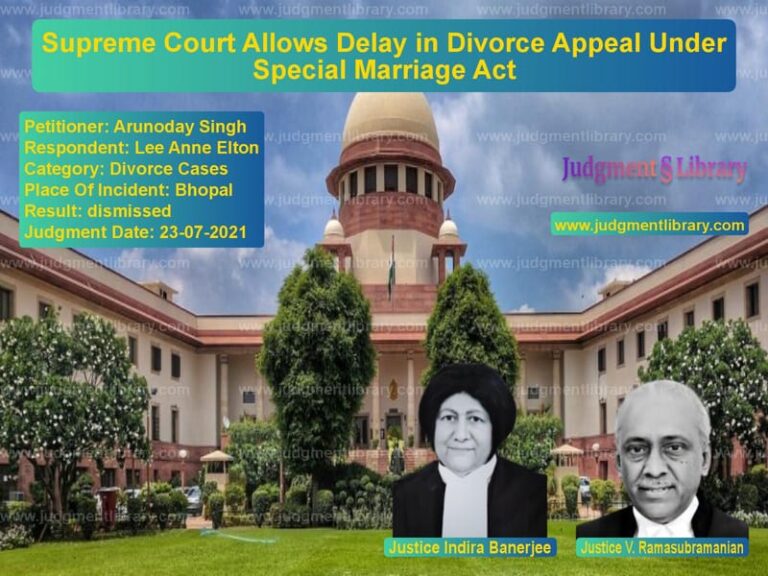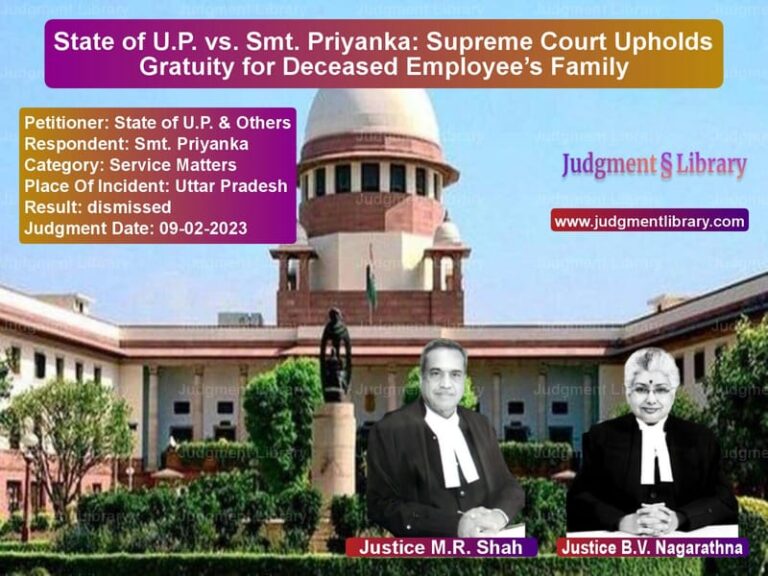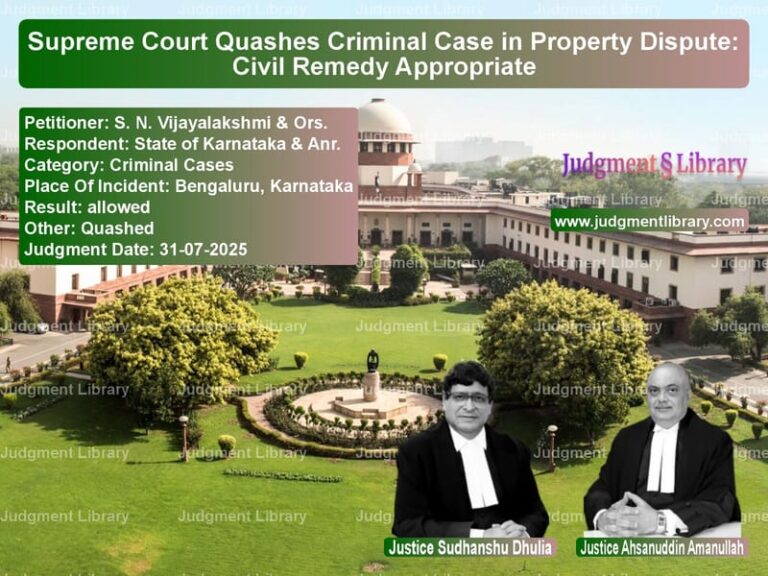Land Acquisition and Compensation: Supreme Court Dismisses Appeal with Conditions
The case of Delhi Development Authority v. Manish and Ors. revolves around a land acquisition dispute where the Delhi Development Authority (DDA) sought to appeal against the decision in favor of the respondents, who were landowners challenging the acquisition process. The case primarily concerned the application of the Right to Fair Compensation and Transparency in Land Acquisition, Rehabilitation, and Resettlement Act, 2013 (RFCTLARR Act) and the delay in initiating proceedings for land acquisition. The Supreme Court, after considering the facts and previous judgments, dismissed the appeal and imposed conditions on the DDA regarding the future of the land acquisition proceedings.
Background of the Case
The dispute began when the Delhi Development Authority sought to acquire land for a public project. The respondents, landowners, objected to the acquisition, claiming that the process was flawed, and the compensation offered was insufficient. The appellants (DDA) had initially filed the appeal after the lower courts ruled in favor of the respondents, recognizing certain procedural irregularities in the acquisition process. The case was escalated to the Supreme Court for final adjudication.
The core issue in the case was whether the DDA had followed due process under the RFCTLARR Act, particularly regarding the initiation of land acquisition proceedings and the timeline for compensation under the Act. The respondents argued that the acquisition process was delayed, and as such, they should not be deprived of the land without proper compensation and in a manner consistent with the principles of fairness established in the Act.
Appellant’s Arguments
The Delhi Development Authority, represented by its legal counsel, presented the following arguments:
- The DDA had followed the necessary steps for land acquisition under the law, including issuing the initial notification and conducting the relevant proceedings for acquiring land for public purposes.
- The delay in completing the acquisition process was due to procedural hurdles and challenges posed by the respondents.
- The compensation offered was in line with the applicable laws, and any further objections regarding the compensation process were not substantiated by legal grounds.
Respondent’s Counterarguments
The respondents, represented by their legal counsel, countered the DDA’s claims by arguing:
- The land acquisition process was fundamentally flawed, particularly in the delay in the proceedings, which violated their right to timely and fair compensation.
- Under Section 24(2) of the RFCTLARR Act, since the acquisition proceedings were not completed within five years, the land should revert back to the landowners.
- The compensation offered was inadequate, and they had not been adequately consulted or compensated for the land acquisition.
Supreme Court’s Judgment
The Supreme Court, comprising Justices Kurian Joseph and R. Banumathi, addressed the issues raised and made the following observations:
- The Court recognized that the case was governed by the provisions of the RFCTLARR Act, 2013, and acknowledged the importance of ensuring fairness in the land acquisition process.
- It was noted that there had been substantial delays in the initiation of acquisition proceedings, which impacted the respondents’ right to a fair process as mandated by the Act.
- The Court found that, while the delay was significant, it was not sufficient to nullify the entire acquisition process. However, it noted that the DDA should be granted a limited period of time to comply with the necessary legal formalities.
- The appellants were granted a one-year period to initiate the acquisition proceedings afresh, under Section 24(2) of the RFCTLARR Act, to ensure that the process adhered to the requirements of the law.
- The Court also stated that if the DDA failed to initiate the fresh acquisition proceedings within this period, the land would be returned to the original owners, if the DDA was still in possession.
- Regarding pending applications, the Court ordered that they stand disposed of, without any further adjudication or costs to be imposed.
The final ruling was as follows:
- The appeal filed by the DDA was dismissed.
- The DDA was given one year to initiate fresh land acquisition proceedings, and failure to comply would result in the return of the land to the respondents.
- There would be no further orders regarding costs, and any pending applications related to the case were disposed of.
Key Legal Takeaways
This judgment highlights several key legal principles:
- Right to Fair Compensation: The Court emphasized that landowners must be treated fairly and receive appropriate compensation for land acquisition, especially when delays occur in the acquisition process.
- Strict Adherence to Procedural Laws: The judgment reaffirms the importance of adhering to the timelines and procedural requirements laid out in the RFCTLARR Act, 2013.
- Limited Time for Government Authorities: The Court allowed the DDA one year to comply with the statutory requirements, after which the land would revert to the landowners.
- Impact of Section 24(2): Section 24(2) of the RFCTLARR Act allows landowners to reclaim their land if acquisition proceedings are not completed within a specified period, providing them with a safeguard against prolonged or incomplete acquisitions.
Implications for Future Land Acquisition Cases
This ruling will have a significant impact on future land acquisition cases, particularly in ensuring:
- Timely and fair treatment of landowners in land acquisition matters, with due consideration for delays caused by government authorities.
- Public sector authorities must take action to comply with procedural timelines to avoid legal consequences such as the reversion of land.
- The use of Section 24(2) to prevent indefinite delays in land acquisition proceedings and ensure that landowners are not left in a state of uncertainty.
Conclusion
The Supreme Court’s ruling in Delhi Development Authority v. Manish and Ors. underscores the importance of timely and transparent land acquisition proceedings, particularly in cases involving public sector authorities. By granting a limited time for the DDA to initiate the proceedings afresh, the Court ensured that the rights of landowners were protected while also providing a fair opportunity for the authorities to comply with the legal framework. This judgment strengthens the principles of fairness and transparency in the land acquisition process and will serve as a guiding precedent for future cases.
Don’t miss out on the full details! Download the complete judgment in PDF format below and gain valuable insights instantly!
Download Judgment: Delhi Development Au vs Manish and Ors. Supreme Court of India Judgment Dated 20-03-2017.pdf
Direct Downlaod Judgment: Direct downlaod this Judgment
See all petitions in Property Disputes
See all petitions in Landlord-Tenant Disputes
See all petitions in Specific Performance
See all petitions in Judgment by Kurian Joseph
See all petitions in Judgment by R. Banumathi
See all petitions in dismissed
See all petitions in supreme court of India judgments March 2017
See all petitions in 2017 judgments
See all posts in Civil Cases Category
See all allowed petitions in Civil Cases Category
See all Dismissed petitions in Civil Cases Category
See all partially allowed petitions in Civil Cases Category







